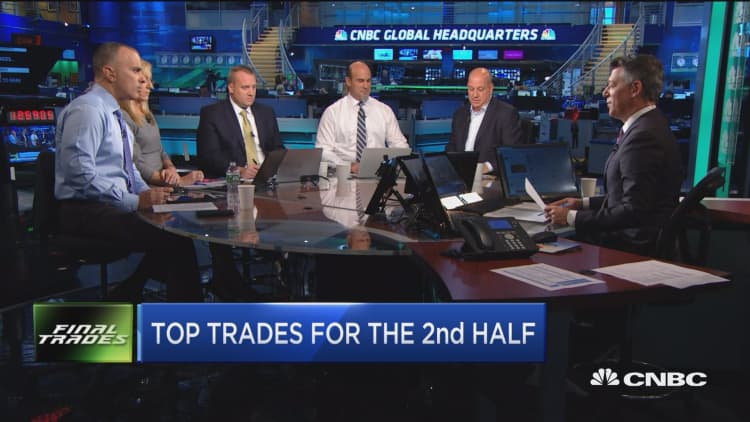Earlier this year, Juul Labs quietly spun out of vaping company Pax Labs and quickly catapulted up the charts to become the top e-cigarette producer on the market. Now, the San Francisco-based company is raising $150 million in its first financing as an independent company.
The separation allowed Juul to focus on people seeking an alternative to cigarettes, while Pax, which lets users pack their own loose leaves, exists in a hybrid world between nicotine and various sorts of plants.
Last week, Juul hired Kevin Burns from Chobani to be CEO.
And now the company is raising money. It's already reeled in $111.5 million from 23 investors, according to a filing with the SEC on Tuesday. In what's described as a convertible note, the company still has $38.5 million left to raise.
A Juul spokesperson confirmed the filing but declined to provide additional details.
While they've formally separated, the relationship between Pax and Juul is complicated. Tyler Goldman became CEO of Pax in August 2016 and held the top position at both companies after the split. With the Burns announcement on Dec. 11, Juul said that Goldman "intends to pursue new entrepreneurial opportunities."
Goldman has also left Pax. That company, which expects to announce a new CEO soon, declined to comment for this story.
James Monsees and Adam Bowen, the co-founders of Pax, have left that company as well: Monsees' LinkedIn page says he left Pax in July, while Bowen's profile indicates he left a month earlier. Both are are now top executives and board members at Juul.
Winning a controversial market
Meanwhile, Juul is in rapid growth mode.
E-cigarette market share
| Company | Market share, last 4 weeks | YoY growth for 52 weeks |
|---|---|---|
| Juul Labs | 32.9% | 699.0% |
| BAT | 27.4% | 22.3% |
| Altria | 15.2% | 72.2% |
| Imperial Tobacco | 11.4% | 1.5% |
| Logic (Japan Tobacco) | 7.2% | 13.9% |
Source: Nielsen / Wells Fargo
Juul's flat rectangular devices, shaped like USB sticks, hit the market in mid-2015 and have surpassed similar devices from the tobacco giants. Bonnie Herzog, an analyst at Wells Fargo, wrote in a report last month, citing Nielsen data over the prior four weeks, that Juul controls 32.9 percent of the market, ahead of British American Tobacco at 27.4 percent and Altria at 15.2 percent.
According to the Nielsen data, Juul has generated revenue growth of almost 700 percent to $224.6 million in the past year, as of the November report. The total e-cigarette market expanded 40 percent to $1.16 billion.
Juul claims that its mission is to eliminate cigarette usage by providing the 1 billion smokers worldwide "with a better alternative to combustible cigarettes."
Ex-CEO Goldman told CNBC in October that the company was struggling to meet its mission because it was supply constrained. He said that every month the company produces 20 million products, including devices and cartridges, but that it wasn't producing pods, which contain the nicotine, quickly enough to meet demand.
"To achieve our mission, we really need to make sure that we have enough pods per device," Goldman said. "If we're not getting enough devices out into the marketplace, it means we're not giving people the option to switch to Juul."
A Juul customer, Staci Starnes, also told CNBC at the time that about six months after she started using the product, she began experiencing problems with pods leaking into the device and her mouth. Starnes, from Charlotte, North Carolina, said she'd switched to a different brand.
Given that Juul is in the nicotine business, controversy is inevitable. A study earlier this month in the American Journal of Medicine found that among young adults who didn't smoke cigarettes, those who used e-cigarettes were more than four times as likely than non-vapers to start smoking traditional cigarettes within 18 months.

There's also the ongoing competitive and regulatory risk. In May, the Food and Drug Administration started a year-long scientific review of a new type of so-called heat-not-burn product from Philip Morris. The system called IQOS (I quit ordinary smoking) is currently available in about 30 countries, including Canada and many countries in Europe.
Wells Fargo's Herzog said in her November report that IQOS is a "superior technology" and "we expect customers to shift from e-cig/ vapor to next-generation reduced-risk products" like IQOS.
Other Juul board members, according to Tuesday's filing, include billionaire Nicholas Pritzker, Riaz Valani of Global Asset Capital and health-care investor Hoyoung Huh.
— CNBC's Angelica LaVito contributed to this report.
(Correction: An earlier version of this story mistakenly stated that e-cigarettes contain tobacco.)


